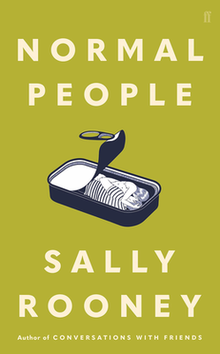The Discussions of Class and Social Status in Normal People

Image via Wikipedia
November 7, 2021
Normal People is a treasure of a novel about human connection, the power of relationships, and how we relate to one another. It tells us the story of two people named Connell and Marianne and the complicated relationship that is life-changing for both of them. While it is mostly about this relationship, it also holds impactful discussions about class and social status in relation to identity and relationships.
At the beginning of the book, we are introduced to our two main characters: Connell and Marianne. Connell is a member of the working class, and he struggles with covering up his true self to continue being held at high social status. His mother works as a cleaning lady for Marianne’s family, which Connell wishes to keep a secret. Marianne comes from a much wealthier background, but she is separated from her peers because of it. Despite their differences, the two of them have an instant connection and spark up an intense relationship. They both struggle with feelings of loneliness and alienation related to their identity and find comfort in the fact that they can be themselves around each other. However, their social and class differences are ever-present- causing an interesting power dynamic.
Their dynamic begs the question; how does a divide in class present itself in relation to identity? How does it affect our relationships? Rooney presents some insight into these questions. Although the subject of money is avoided whenever possible, Connell notices many ways Marianne either fails to acknowledge her privilege or takes it for granted. Their initial meeting especially showcases their differences, with Marianne living in a mansion and Connell’s mom working for them. The glaring contrasts in their lifestyles are hard to miss.
When Marianne and Connell both earn a prestigious scholarship to a university in Dublin, we see an example of the privilege Marianne has. Despite knowing she can pay for college, Marianne applies for a prestigious scholarship simply to showcase her intellectual abilities. However, for Connell, this scholarship is a much bigger deal- he could not pay for college without it. He feels as if his whole life changes after receiving the money. Marianne lacks a basic awareness that the scholarship could have gone to someone else who needed the money much more than she did.
The differences become much more evident when they go to college. Rooney brilliantly shows the privilege and elitist environment of the university. The power dynamic switches, with Marianne becoming popular among the prestigious scholarly people at her school. Marianne lives in her family’s house, while Connell shares a small apartment with two other people. This illustrates how difficult it can be for members of the working and middle class to fit in among members of the upper class, despite getting the same scholarship and going to the same school. Connell feels isolated among these people he doesn’t relate to and is overcome with depression and anxiety related to school. Although a fictional story, this brings an important issue to light- how economic class can affect education and mental health.
When Connell loses his job and cannot afford to live in Dublin, he doesn’t ask Marianne for fear of being indebted to her, which eventually leads to a breakup. They find their way back to each other, but this situation is just one of the many ways a class can cause a strain on relationships. While the issue of class isn’t the main reason their relationship didn’t initially work out, it still presents a strain that caused issues.
Sally Rooney’s Normal People is an important book for so many reasons. It presents a look at the ways things such as class affect relationships and identity, as well as the importance of acknowledging the privilege we have. Rooney describes how society and concepts such as popularity and even class separate us from one another- when the most important thing is human connection.




































































































































Gwen • Nov 9, 2021 at 10:31 am
so good 🙂